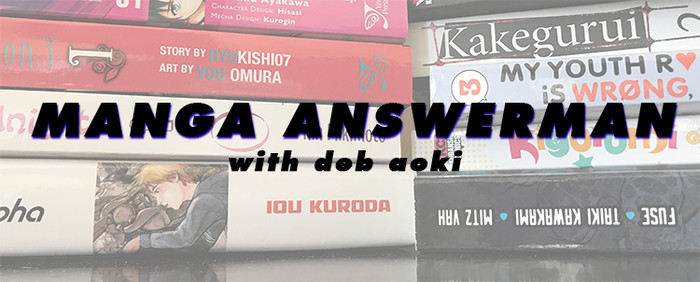Manga Answerman
Why are there so many sound effects in manga?
by Deb Aoki,

This might sound like a simple question, but I've always wondered: why are there so many sound effects in manga?
Sound effects are a part of Western comics too (e.g. Ka-Pow! Whoosh!), but Japanese comics are unique in that besides onomatopoeia (words for sounds that mimic the sounds it describes, such as “nyan nyan” for a cat meowing), there's gitaigo, or sound effects that are meant to evoke feelings or expressions that may have no sound at all. For example, there's “mero mero” (めろめろ) – which is used to evoke the soft, warm feeling when someone is really smitten/in love with someone or something), and sound effects for no sound at all – like “shiiiin” (しーーーん) for silence.
Unlike anime, there's no sound when you read manga, so the sound effects are there to create a mood. One might argue that there's no need for a sound effect for smiling if you simply show someone smiling, and no need for a sound effect if it's to convey that a room is quiet. But it's become such a convention in Japanese comics, many manga creators do it just as a matter of fact thing – that it's something they expect as readers and something they're just used to doing as creators – such that it almost feels odd when it's not there.
Some manga creators use sound effects as part of their art to dramatic effect – Hirohiko Araki's use of sound effects in Jojo's Bizarre Adventures are so distinctive, they're almost a character in the comics themselves. Asano Inio's use of sound effects in Dead Dead Demon's Dededededestruction almost double as walls or architecture in the background of his manga.
While some manga publishers opt to localize / redraw the sound effects in some manga to replace the Japanese characters with English equivalent letters. This adds additional production time and expense, as it creates additional work for the lettering / touch-up work before publication. That's why you don't see this type of touch-up in digital simul-pub manga, as the production schedule is much shorter than it is for print publication.
Meanwhile, some publishers opt to leave the Japanese sound effects in the manga in as is, and add a translation in small English letters next to it. In some extreme cases, some publishers leave the Japanese sound effect, translate what the Japanese characters say, and then give a translation of what it means. For example, (ニコニコ, with “niko niko” and “grin grin.” I personally think that's overkill / makes the panel look too busy, but maybe that's just me?
What's your favorite or the weirdest Japanese manga sound effect you've seen so far? Add your thoughts in the forum.
Do YOU have a question for the Answerman?
We want your questions! Send in as many or as often as you like. We can only pick three questions a week (and unfortunately I don't have ALL the answers) so if you haven't been chosen, don't be discouraged, and keep on sending.
However, READ THIS FIRST:
- CHECK THE ARCHIVES FIRST. I've answered a lot of questions already!
- If you want to be a voice actor, READ THIS.
- I can't tell you if or when a show will get another season. New productions are closely guarded secrets until they're publicly announced, so there's nothing I can tell you that Google can't.
- I cannot help you get in touch with any producers, artists, creators, actors or licensors. If you're trying to pitch an idea, you should read this.
- I usually won't bother with questions asking if something is a trend. Maybe? It's impossible to know until it becomes obvious.
- I take questions by email only. (Tweeted questions get ignored!)
- I will not do your homework/research/report for you.
- Keep it short -- like, a paragraph at most, and use proper grammar or punctuation.
Got all that? Great! The e-mail address is [email protected] (answerman at animenewsnetwork.com). And thanks!!
Deb Aoki was the founding editor for About.com Manga, and now writes about manga for Anime News Network and Publishers Weekly. She is also a comics creator/illustrator, and has been a life-long reader of manga (even before it was readily available in English). You can follow her on Twitter at @debaoki.
discuss this in the forum (12 posts) |